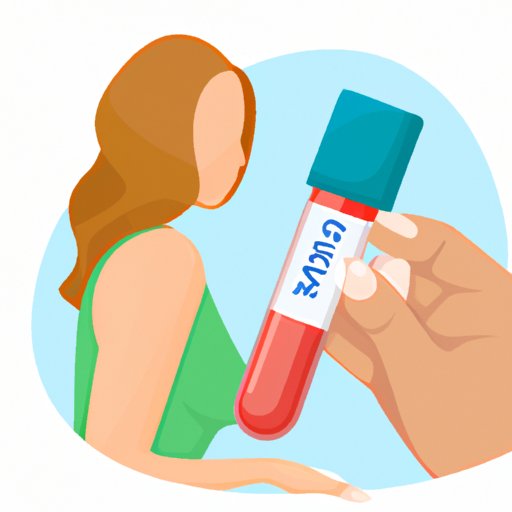
I. Introduction
Herpes is an incredibly common sexually transmitted infection (STI) that affects millions of people worldwide. While testing for herpes during an outbreak is a standard procedure, many people wonder if they can test for herpes without an outbreak occurring. In this article, we’ll explore the importance of testing for herpes, even when symptoms aren’t present. We’ll also address some common misconceptions about testing and discuss different types of testing methods that can be used.
II. The Importance of Testing for Herpes Even without an Outbreak
Herpes is a viral infection that typically causes outbreaks of painful sores or blisters on or around the genitals, anus, or mouth. Other symptoms can include itching, burning, and flu-like symptoms. However, not everyone infected with herpes will experience visible symptoms. Herpes is most contagious when symptoms are present, but it can still be transmitted when there are no visible signs of infection.
A. Symptoms of herpes
The symptoms of herpes can vary from person to person and can range from mild to severe. The most common symptoms of genital herpes are:
- Painful blisters or sores on or around the genitals, anus, or mouth
- Itching or burning
- Flu-like symptoms such as fever, headache, and body aches
- Painful urination or difficulty urinating
- Tender, swollen lymph nodes in the groin
- Redness, swelling, and blistering on the genital area
B. Why testing is important
Testing for herpes is important for several reasons, even when you don’t have symptoms. First, testing can help you determine if you have been infected with the herpes virus, which can be difficult to diagnose without testing. Second, testing can help you prevent the spread of herpes to others, even if you don’t have visible symptoms. Third, early detection through testing can help you get treatment and manage your symptoms more effectively.
C. The benefits of early detection
Early detection and treatment of herpes can help manage symptoms and prevent the spread of the virus to others. Antiviral medications can help shorten the duration of outbreaks and reduce the frequency of outbreaks. Additionally, taking antiviral medications can help reduce the risk of transmitting the virus to your sexual partner.
III. Asymptomatic Herpes and Undetected Infection
Asymptomatic herpes is a term used to describe herpes infections where no visible symptoms are present. Approximately 80% of people infected with herpes will not experience visible symptoms, or they may mistake their symptoms for something else. This means that many people with herpes are unaware that they have been infected.
A. Explanation of asymptomatic herpes
Asymptomatic herpes does not mean that the virus is dormant or inactive. Instead, it means that the virus is present in the body but is not causing visible symptoms. Asymptomatic herpes is most commonly transmitted when there are no visible symptoms present.
B. The risk of undetected herpes
The risk of undetected herpes is that it can be transmitted to others without the infected person even realizing they’re contagious. This puts sexual partners at risk of contracting herpes, which can lead to long-term health complications. This risk is why testing for herpes is so important, even when there are no visible symptoms present.
C. How herpes can go undetected for years
Herpes can go undetected for years, which means that infected individuals can unknowingly transmit the virus to others. The virus can remain dormant in the body for extended periods, and symptoms may only occur sporadically or not at all. Without testing, it can be challenging to diagnose herpes since other medical conditions can present symptoms similar to herpes.
IV. Comparing the Accuracy of Various Herpes Testing Methods
Testing for herpes is essential for early diagnosis and effective treatment. There are several types of testing methods available, each with varying degrees of accuracy.
A. Different testing methods
The most common testing methods for herpes include:
- Herpes culture
- PCR (Polymerase chain reaction) test
- Antibody test
- Blood test
B. Comparison of accuracy
Each testing method has its level of accuracy, but PCR tests and antibody tests are considered the most reliable testing methods for detecting herpes. Herpes culture tests are less reliable and are more likely to produce inaccurate results. Blood tests can detect the presence of herpes antibodies, but cannot indicate when the infection occurred.
C. The benefits of testing in different settings (clinic, home, lab)
Testing for herpes can be done in a variety of settings, including clinics, labs, and at home. The type of testing done may depend on personal preference, convenience, and cost. Testing at a clinic or lab can be more accurate than at-home testing, but at-home testing can be more convenient and less expensive.
V. Understanding the Risks of Transmitting Herpes without Visible Symptoms
Herpes can still be transmitted even when there are no visible symptoms of an outbreak. This is because the virus can be present in bodily fluids and can be spread through skin-to-skin contact.
A. Transmission of herpes
Herpes is most commonly transmitted during sexual activity, such as vaginal, anal, or oral sex. The virus is present in herpes sores or blisters, but it can also be present in the surrounding skin. Herpes can also be transmitted through skin-to-skin contact, even when there is no visible outbreak.
B. Risk of transmission when symptoms are not present
The risk of transmitting herpes when no symptoms are present can vary depending on the specific herpes strain and location of the infection. However, it is generally believed that the risk of transmission is lower when symptoms are not present.
C. How to prevent transmission of herpes
The best way to prevent the spread of herpes is to avoid skin-to-skin contact during outbreaks. Using barrier methods during sexual activity, such as condoms or dental dams, can also help reduce the risk of transmission. Regular testing for herpes can also help reduce the risk of transmission.
VI. The Psychological Impact of Living with Undiagnosed Herpes
Living with undiagnosed herpes can have a significant psychological impact on individuals. Fear of transmission, stigma, and shame can all contribute to psychological distress in those living with herpes.
A. Emotional impact of living with undiagnosed herpes
The emotional impact of living with undiagnosed herpes can be severe. Fear of transmitting the virus to others can cause significant anxiety and stress. Living with the stigma attached to herpes can lead to feelings of shame and isolation, reducing overall quality of life.
B. How to manage the psychological impact
Talking about herpes with sexual partners, seeking support from a healthcare provider or mental health professional, and learning more about herpes can all help individuals manage the psychological impact of living with herpes.
C. The benefits of getting tested and diagnosed
Getting tested and diagnosed is the first step in managing the psychological impact of living with herpes. Early detection can help individuals seek appropriate treatment and reduce the risk of transmitting the virus to others. Getting diagnosed can also reduce feelings of shame and stigma, allowing individuals to feel more empowered and in control.

VII. Debunking Common Myths about Herpes Testing
There are several common myths about herpes testing that can prevent individuals from seeking appropriate medical care.
A. Common myths about herpes testing
- Myth: You can’t get tested for herpes if you don’t have symptoms.
- Myth: Testing for herpes is painful.
- Myth: A negative test for herpes means you don’t have the virus.
B. The truth about herpes testing
Testing for herpes is available, even when you don’t have visible symptoms. Testing is typically done using blood tests or swabs of the genital area. Testing for herpes is not painful and is a standard procedure for diagnosing sexually transmitted infections.
C. How to address common misconceptions
Educating individuals about the accuracy and availability of herpes testing can help address common misconceptions. Encouraging individuals to seek medical care and get tested for herpes can help reduce the spread of the virus and promote overall sexual health.
VIII. Encouraging Individuals to Prioritize their Sexual Health and Get Tested Regularly, Even if Symptoms aren’t Present
Regular testing for herpes is critical for early detection and prevention of the spread of the virus. Encouraging individuals to prioritize their sexual health and get tested regularly, even when symptoms aren’t present, can help reduce the risk of transmission and promote overall sexual health.
A. Importance of sexual health
Sexual health is an essential component of overall health and well-being. Regular testing for sexually transmitted infections, including herpes, can help individuals manage their sexual health and prevent the spread of infections to others.
B. Encouraging individuals to get tested
Encouraging individuals to get tested for herpes, even when symptoms aren’t present, can help reduce the spread of the virus and promote overall sexual health. Access to information, testing, and treatment can all help individuals make informed decisions about their sexual health.
C. Strategies to promote regular testing
Improved access to testing and treatment, education about sexual health, and reducing the stigma associated with herpes can all help promote regular testing. Encouraging open and honest communication about sexual health with sexual partners can also reduce the risk of infection and promote overall health and well-being.
IX. Conclusion
Testing for herpes, even when no symptoms are present, is essential for early detection, effective treatment, and prevention of transmission. Understanding the risks of herpes transmission, the accuracy of different testing methods, and the psychological impact of living with undiagnosed herpes can all help individuals prioritize their sexual health and seek appropriate medical care. Encouraging regular testing and reducing the stigma associated with herpes can also promote overall health and well-being for individuals and communities.




